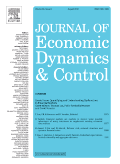
JOURNAL OF ECONOMIC DYNAMICS & CONTROL
Scope & Guideline
Harnessing Knowledge for Real-World Economic Applications
Introduction
Aims and Scopes
- Dynamic Economic Modeling:
The journal consistently publishes research that employs dynamic models to understand economic behavior, focusing on how decisions evolve over time and influence future outcomes. - Policy Analysis and Control Mechanisms:
A core area of the journal is the analysis of monetary and fiscal policies, exploring how different control mechanisms can stabilize or destabilize economies. - Quantitative and Computational Methods:
The journal emphasizes the use of quantitative techniques, including econometrics, simulation methods, and machine learning, to analyze economic dynamics and improve model accuracy. - Behavioral Economics and Decision-Making:
Research frequently explores the intersection of behavioral economics and traditional economic models, providing insights into how psychological factors influence economic decisions. - Financial Markets and Macroeconomic Interactions:
The journal presents a strong focus on the interplay between financial markets and macroeconomic variables, examining how financial innovations and crises affect overall economic dynamics.
Trending and Emerging
- Climate Economics and Sustainability:
Research on the economic impact of climate change and sustainability practices is rapidly increasing, highlighting the need for innovative economic policies that address environmental challenges. - Machine Learning and AI in Economics:
There is a growing trend towards integrating machine learning and artificial intelligence into economic modeling, enabling more sophisticated analyses of complex economic phenomena. - Behavioral Insights in Macroeconomics:
An increasing number of studies are incorporating behavioral insights into macroeconomic models, reflecting a trend towards understanding the psychological factors that influence economic decision-making. - Financial Stability and Crises:
Publications focusing on financial stability, the implications of financial market dynamics, and the effects of crises on economic policy are becoming more prominent, particularly in the context of recent global economic events. - Dynamic Inequality and Wealth Distribution:
Research addressing issues of inequality and wealth distribution dynamics is emerging, emphasizing the importance of these factors in shaping economic policy and growth.
Declining or Waning
- Traditional DSGE Models:
While still relevant, there has been a noticeable decline in the focus on traditional Dynamic Stochastic General Equilibrium (DSGE) models, as researchers increasingly seek more flexible and adaptive frameworks. - Static Economic Models:
Static models are becoming less favored as the journal's emphasis on dynamic analysis and real-time decision-making grows, leading to fewer publications on conventional static approaches. - Single-Country Studies:
Research concentrating solely on individual country contexts is waning, with a shift towards more comparative and global analyses that consider cross-country dynamics. - Linear Econometric Techniques:
The use of linear econometric methods is declining as researchers adopt more complex, non-linear approaches that better capture economic realities. - Historical Economic Analysis:
There seems to be a decreasing interest in purely historical economic analyses, as the focus shifts towards contemporary issues and real-time data applications.
Similar Journals
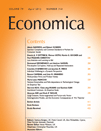
ECONOMICA
Pioneering Insights in Economics and EconometricsEconomica is a prestigious academic journal published by Wiley, with a rich history dating back to 1937. Based in the United Kingdom, this journal has established itself as a key resource in the field of Economics and Econometrics, classified in the top quartile (Q1) of its category for 2023. With an ISSN of 0013-0427 and an E-ISSN of 1468-0335, Economica covers a wide array of topics that contribute to the understanding of economic theory and practice, making it essential reading for researchers, professionals, and students alike. Despite being a subscription-based journal, its rigorous editorial process ensures that only the highest quality research is published, further bolstering its impact and influence in the academic community. The journal plays a vital role in advancing economic scholarship by featuring original research articles, critical reviews, and innovative methodologies, promoting discourse among scholars and practitioners.

Quantitative Economics
Pioneering the intersection of data and economic understanding.Quantitative Economics is a leading open-access journal published by WILEY, dedicated to advancing the field of economics through rigorous quantitative analysis. Established in 2010 and based in the United States, this influential journal boasts an impressive Q1 rating in the 2023 category of Economics and Econometrics, reflecting its high impact and quality within the field. With a Scopus ranking of #222 out of 716 in the Economics and Econometrics category, it sits comfortably in the 68th percentile, underscoring its relevance to researchers and professionals alike. The journal accepts a wide range of submissions, including original research articles, methodological advancements, and comprehensive reviews, which contribute to the understanding and application of quantitative methods in economic research. By providing immediate open access to all published articles, Quantitative Economics ensures that vital findings are readily available to academics, policymakers, and students across the globe, enhancing collaboration and innovation within the discipline.

Montenegrin Journal of Economics
Empowering Economic Discourse GloballyMontenegrin Journal of Economics, published by ECONOMIC LABORATORY TRANSITION RESEARCH PODGORICA-ELIT, stands as a prominent platform for scholarly discourse in the field of Economics, Econometrics, and Finance. With an ISSN of 1800-5845 and an E-ISSN of 1800-6698, this open access journal has been providing accessible research output since 2005, contributing significantly to the global academic community. The journal’s impact is reflected in its Q2 ranking in the 2023 category of Economics, Econometrics and Finance, holding a commendable position within the 81st percentile according to Scopus rankings. The scope includes a wide array of topics pertinent to economics and finance, encouraging contributions that enhance understanding of both local and global markets. With a focus on quality research, the journal aims to disseminate knowledge that supports informed policy-making and fosters economic development, making it an invaluable resource for researchers, professionals, and students dedicated to the evolving landscape of economic studies.
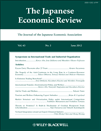
JAPANESE ECONOMIC REVIEW
Fostering scholarly dialogue on Asia-Pacific economic processes.Japanese Economic Review, published by Springer Heidelberg, is a renowned academic journal that aims to advance the understanding of economic processes within the context of Japan and the Asia-Pacific region. With an ISSN of 1352-4739 and E-ISSN of 1468-5876, this journal features high-quality research articles that span a broad range of topics in economics and econometrics. Ranked in the Q2 category for Economics and Econometrics as of 2023, it holds a Scopus rank of #332 out of 716, placing it in the 53rd percentile among its peers. Although not Open Access, the journal invites contributions that provide insights and empirical analyses beneficial to both academics and practitioners. Emphasizing a deep understanding of economic dynamics, the Japanese Economic Review is essential reading for anyone interested in the implications of economic policies and trends, making it a significant platform for scholarly dialogue and research dissemination.
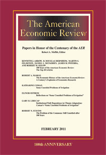
AMERICAN ECONOMIC REVIEW
Shaping the Future of Economics Through Rigorous Research.AMERICAN ECONOMIC REVIEW, published by the American Economic Association, stands as one of the most prestigious academic journals in the field of Economics and Econometrics. With an impressive impact factor and ranking of #9 out of 716 in its category, this journal has achieved a notable position within the top 2% of journals globally, as evidenced by its Q1 classification in 2023. Covering a broad spectrum of economic theory and applied research, it serves as a primary platform for the dissemination of high-quality scholarly work, contributing significantly to the ongoing dialogue within the discipline. Although Open Access options are not available, the journal's rigorous peer-review process ensures that published articles uphold the highest standards of academic integrity and relevance. With coverage spanning from 1973 to 2024, the AMERICAN ECONOMIC REVIEW continues to be an essential resource for researchers, professionals, and students eager to stay at the forefront of economic thought and innovation.

Applied Economics Journal
Exploring practical applications of economic theories for global impact.Applied Economics Journal is a premier academic publication dedicated to the advancement and dissemination of research in the field of applied economics. Published by Kasetsart University, Faculty of Economics, this journal serves as a vital platform for scholars, professionals, and students eager to explore current economic theories and their practical applications in diverse contexts. With its Open Access policy, the journal ensures that high-quality research is accessible to a global audience, encouraging knowledge sharing and collaboration. Although the journal is in its early stages with a developing HIndex, it is poised to become a key resource in the economic research community, fostering innovative approaches to real-world economic challenges. The journal welcomes submissions that delve into various aspects of applied economics, aiming to enhance understanding and contribute to policymaking and economic strategies across different sectors.
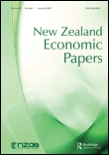
New Zealand Economic Papers
Connecting theory and practice in the realm of New Zealand economics.New Zealand Economic Papers is a prominent academic journal dedicated to the field of economics, published by Taylor & Francis Ltd. With its ISSN 0077-9954 and E-ISSN 1943-4863, this journal has been a significant contributor to economic discourse since its inception in 1966, continuing to provide valuable insights through to 2024. As part of the third quartile (Q3) in the Economics, Econometrics and Finance category, it ranks at #165 out of 288 in Scopus, placing it within the 42nd percentile, demonstrating its respectable impact in the academic community. Although the journal does not offer open access, it remains a vital resource for researchers, professionals, and students interested in understanding economic dynamics, policy analysis, and applied econometrics, particularly in the context of New Zealand. The journal's commitment to rigorous research ensures that it continues to play a crucial role in shaping economic policy and academic thought across the globe.
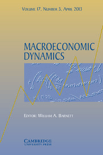
MACROECONOMIC DYNAMICS
Elevating Understanding of Economic Trends and ImpactsMACROECONOMIC DYNAMICS, a distinguished academic journal published by Cambridge University Press, serves as a pivotal platform for innovative research in the fields of economics and econometrics. With its ISSN 1365-1005 and E-ISSN 1469-8056, the journal has been at the forefront of scholarly communication since its inception in 1997, offering an extensive range of articles that explore dynamic economic models, policy impacts, and theoretical advancements through the latest empirical analyses. Currently holding a Q2 ranking within the 2023 Economics and Econometrics category, and positioned at rank #409 out of 716 within Scopus, it is an essential resource for researchers, professionals, and students alike, looking to stay updated on critical developments in macroeconomic theory and practice. Although it follows a traditional subscription model rather than Open Access, the journal continually strives to disseminate high-quality, peer-reviewed content that informs and inspires the global economics community. The importance of MACROECONOMIC DYNAMICS lies in its commitment to fostering a deeper understanding of economic phenomena, making it a must-read for anyone engaged in the complexities of the economic landscape.

ECONOMIC THEORY
Exploring the Depths of Economic UnderstandingECONOMIC THEORY is a leading academic journal published by Springer, dedicated to advancing the field of economics through the dissemination of innovative and high-quality research. Established in 1991, this journal has become a crucial resource for researchers, professionals, and students interested in theoretical economics and econometrics. With a strong reputation, it ranks in the Q1 category for Economics and Econometrics as of 2023, exemplifying its influence and contribution to the discourse in the field. The journal operates without Open Access options, ensuring that all published content undergoes rigorous peer-review, maintaining scholarly integrity. Scholars can access the journal's rich compendium of articles that delve into diverse economic theories, providing invaluable insights and fostering academic dialogue. Headquartered in Germany, ECONOMIC THEORY is committed to shaping the future of economic research and serving as a cornerstone in the academic community.
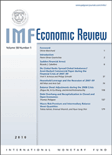
IMF Economic Review
Exploring Innovative Analyses in Economics and BusinessIMF Economic Review, published by Palgrave Macmillan Ltd, stands as a preeminent journal in the fields of Economics and Business Management, holding a prestigious Q1 ranking in both categories as of 2023. With an ISSN of 2041-4161 and an E-ISSN of 2041-417X, this journal not only showcases high-quality, peer-reviewed research but also embraces the principles of Open Access, promoting wide dissemination of its findings to researchers, professionals, and students alike. Spanning significant years from 2010 to 2024, the IMF Economic Review features innovative analyses and insights that challenge conventional economic paradigms and foster deeper understanding of global economic dynamics. Its impressive Scopus ranking places it in the top 10% of economics journals globally, affirming its vital role in advancing academic discourse and practical application in economics and finance. For those dedicated to exploring the intricacies of economic theory and practice, the IMF Economic Review is an invaluable resource that not only informs but also inspires.